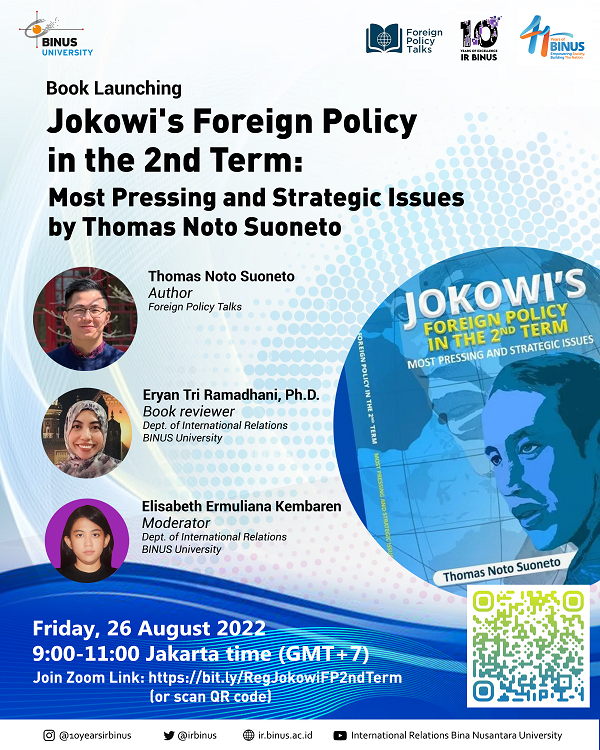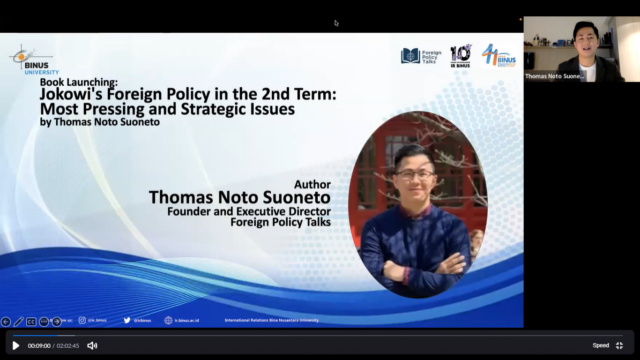Jokowi’s Foreign Policy in the 2nd Term: Most Pressing and Strategic Issues
Launching of Book Written by Thomas Noto Suoneto
On Friday, August 26, 2022, the International Relations (IR) department of Bina Nusantara University (Binus) and the Foreign Policy Talks held a launching of the book entitled Jokowi’s Foreign Policy in the 2nd Term: Most Pressing and Strategic Issues written by Thomas Noto Suoneto. The author, Noto himself, presented the content of the book, while Eryan Tri Ramadhani, Ph.D., an IR Binus faculty member, shared her review of the book. The event was moderated by Elisabeth Ermuliana Kembaren, an IR Binus faculty member.

As the title suggests, this book covers the most pressing and strategic foreign policy issues during the past two years of Joko Widodo’s presidency, since Jokowi was elected as the President of Indonesia for the 2nd time in 2019. Overall, the book highlights some of the most debated topics around Indonesia’s foreign policy under Jokowi which continues to show its dynamics.
The author of this book, Noto, is founder and executive director of the Foreign Policy Talks, as well as an alumnus of IR Binus who graduated in 2017. Since graduating, Noto has then worked as foreign policy analyst at various institutions, as well as founded the FP Talks as a network of foreign policy enthusiasts that drive advanced international expertise and discourse on foreign affairs.
Noto began his presentation of the book by noting that the book is his personal reflection on the topic, consists of a series of commentaries, and discusses the intersection of politics and economy in Jokowi’s foreign policy related to the COVID-19 pandemic and relations with the United States (US), China, and other regional neighbors. It was intended to stimulate debates, discourses, and analyses on Indonesia’s foreign policy.

He then presented a summary of each chapter of the book: first, about key issues of Indonesia’s foreign policy. Second, about how Jokowi sees Indonesia in the post-pandemic world. Third, about Indonesia in the middle of great power contest between the US and China. Fourth, about economic diplomacy at the center of Indonesia’s foreign policy. Fifth, about Indonesia’s position and perception towards China’s Belt and Road Initiative (BRI). Sixth, about the interplay between economic and political forces in Indonesia’s foreign policy. Seventh, about how Indonesia perceives the geopolitical constellation in BRI decisions. Eighth, about the US amidst Indonesia-China BRI cooperation. Ninth, about a new era of US-Indonesia relations. Tenth, about how Minister of Defense Prabowo Subianto has helped shape Indonesia’s foreign policy. Finally, the book ends with the final chapter about some strategic views of Indonesia-Japan ties under Prime Minister of Japan Fumio Kishida.
Dr. Eryan summarized that the major points of the book are about geopolitical dynamics in Southeast Asia regarding China-US rivalry, Indonesia’s “balanced” relations with both China and the US under non-alignment foreign policy, commercial diplomacy as Jokowi’s flagship foreign policy in the second term, domestic considerations rather than international as factors of Indonesia’s foreign policy, and discussion of the complex process of foreign policy decision-making in Indonesia.
She then reviewed three major issues discussed in the book: first, the other actors behind Jokowi’s commercial diplomacy, including ministries and government institutions, business/state-owned enterprises, and the private sectors. Second, the issue of bilateralism vs. multilateralism, highlighting Jokowi’s growing penchant for closer bilateral ties compared to Minister Prabowo’s preference for multilateral approach. Finally, the gap between rhetoric and public opinion, highlighting discourse of the BRI, elite dissents, and public sentiments toward China.
The book is available for pre-order at https://bit.ly/jokowiFP. The book launching was held online via Zoom.


